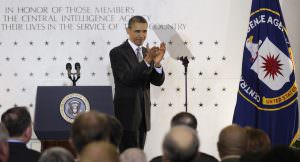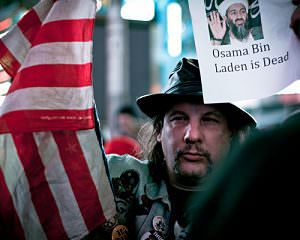Hollywood’s Raid on Convention
So far, I have not seen any negative reviews of "Zero Dark Thirty" and it is with some reluctance that I'm about to write one.
“Zero Dark Thirty” has suddenly emerged as one of the films to beat in this year’s awards competitions. It is an account, seemingly as truthful as a movie can be, of the pursuit (to the death, as we all know) of Osama bin Laden. The film was directed by the gifted Kathryn Bigelow and written by Mark Boal, both of whom scored a deserved success with 2009’s “The Hurt Locker,” which won best picture, best director and best original screenplay Oscars among many other prizes. So far, I have not seen any negative reviews of “Zero Dark Thirty,” and it is with some reluctance that I’m about to write one.
Basically, I think the critics are reviewing the importance of its topic, rather than inherent quality of the work itself. Some noncritical dubiety has been registered about the very lengthy torture sequence with which the film opens — we’ll get to that a little later — but, for the moment, let’s just confine ourselves to the movie as it is presented.
It focuses on a CIA analyst named Maya, who is played by Jessica Chastain. We meet her in the opening, endless sequence in which an al-Qaida operative is being tortured for information about bin Laden’s whereabouts, among other things. She’s new to this stuff, so she winces a little bit at the very rough (and humiliating) treatment. But not for long. She gets with the program in a hurry. Throughout, Chastain plays this character with an icy chill. This, obviously, is a conscious choice on her part, and, of course, Bigelow’s. It’s daring, certainly, but, it seems to me, disastrously distancing. Maya, god knows, doesn’t have to be a babe, but she doesn’t have to be an automaton, either. This may be reality, but it’s not dramatic.
After the torture sequence, the film settles down to a kind of pattern. We see a master shot of some exotic locale. We move down to street level, where people exchange bits of information that we are led to believe bring us marginally closer to discovering bin Laden’s location (the movie covers roughly a decade in what feels like real time). Every so often a bomb is detonated, in violation of Alfred Hitchcock’s basic rule about explosives. The old master held that a bomb is just a rude shock, a meaningless surprise, unless the audience knows it’s there and the characters in the film do not — so we have rooting interest, helpless for us to achieve, as we want to warn the movie’s people of the impending disaster.
Well, OK, “Zero Dark Thirty” is not an exercise in Hitchcockian suspense, but still I think his basic rule applies no matter what the genre. More significantly, you have to wonder what this movie means to be. Spy story? Adventure epic? Or a rather glum account of how bureaucratic turtles sometimes win certain races. To me, it is a plodding story of people stumbling around, looking for elusive clues that finally lead them — yes, of course — to that deadly raid on bin Laden’s compound in Abbottabad, Pakistan, which takes up the last half hour of this two-and-a-half-hour film. It is a well-managed sequence as is most of the movie.
That is to say, the carefully detailed raid expertly matches everything we already know about it and adds to our knowledge many details we may have missed in the extensive press coverage of the event. The excitement of filmmaking, as we watch it unfold, carries us past the inconvenient fact that we already know how this foray ends — as an unabated triumph for American arms. And it gives “Zero Dark Thirty” a legitimately cinematic rationale for its existence.
But still I wonder. This film is, no less than “Lincoln” for convenient example, historicism at play. In a broad sense, we know how any movie (or book or play) dealing with historical circumstances, recent or long ago, “comes out.” But the fact is that a distance of, say, almost 150 years lends a certain enchantment to a subject. If a film is made with care, which mostly means with attention to detail, it is bound to give us information we did not have — if only in the tone of a voice, the drape of a costume, the odd, telling anecdote — or Tommy Lee Jones shredding the scenery. Thereby, it pleases our curiosity. We emerge from it with the feeling that our time has not been wasted, that we have learned something at least moderately interesting about the past, something that we can, if you will, “use” when our thoughts stray toward the history, which is always mysterious, never really settled. (If it could be, there would be no need for historians to keep rewriting, “reinterpreting” it.)At this level, this honorable and ambitious film succeeds, particularly in this truly dismal season of last-minute assaults on meaningless awards rolls toward its climax. I have no way of knowing whether the events it recounts will seem, in 50 or 100 years, worth revisiting. For now, though, “Zero Dark Thirty” seems too close to its topic, sometimes too conventional in the ways it rather sluggishly explicates it. Of the many virtues demanded of the historian, patience is perhaps the largest. Nothing would have been lost had they waited a few more years to make it.
Oh, yes, I almost forgot. I promised to contribute my mite to the torture debate the film has engendered. No question about it, the sequence is very long and extremely vivid. And officialdom is pretty much saying it never indulged in anything like what “Zero Dark Thirty” portrays. I don’t think that is necessarily true. And I don’t think the pleasure the helpless victim’s chief tormentor takes in administering it is necessarily exaggerated. I’ve always assumed that, all pieties aside, the United States of America has its fair share of cheerful sadists and that we can find plenty of use for their talents. It’s an ugly sequence and you should feel utterly free to visit the popcorn counter while it drags on and on. But I’m a movie reviewer — I’ve seen as bad or worse many times. For me, it goes with the territory. This movie’s real problems arise in far less heated areas.
Your support matters…Independent journalism is under threat and overshadowed by heavily funded mainstream media.
You can help level the playing field. Become a member.
Your tax-deductible contribution keeps us digging beneath the headlines to give you thought-provoking, investigative reporting and analysis that unearths what's really happening- without compromise.
Give today to support our courageous, independent journalists.




You need to be a supporter to comment.
There are currently no responses to this article.
Be the first to respond.